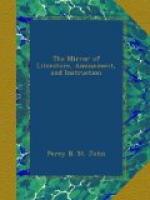even a shelter, and they must wait with patience the
returning seasons before they can reap the fruits
of their industry. All these considerations cannot
be too strongly urged on the mind of the emigrant,
for if they are not expected and guarded against,
disappointment and vexation will assuredly ensue.
“It is a matter of the first importance,”
says Mr. M’Gregor, “for a man living in
the United Kingdom, to consider, before he determines
on expatriation, whether he can, by industry and integrity,
obtain a tolerably comfortable livelihood in the country
of his nativity; whether, in order to secure to his
family the certain means of subsistence, he can willingly
part with his friends, and leave scenes that must
have been dear to his heart from childhood; and whether,
in order to attain to independence, he can reconcile
himself to suffer the inconveniency of a sea voyage,
and the fatigue of removing with his family from the
port where he disembarks in America, to the spot of
ground in the forest on which he may fix for the theatre
of his future operations; whether he can reconcile
himself for two or three years, to endure many privations
to which he had hitherto been unaccustomed, and to
the hard labour of levelling and burning the forest,
and raising crops from a soil with natural obstructions,
which require much industry to remove. If, after
making up his mind to all these considerations, he
resolves on emigrating, he will not be disappointed
in realizing in America any reasonable prospect he
may have entertained in Europe. These difficulties
are, indeed, such as would often stagger the resolution
of most emigrants, if they had not before them, in
every part of America, examples of men who must have
encountered and have overcome equally, if not more
disheartening hardships, before they attained a state
of comfortable affluence.”—
Quart.
Journ. Agr.
* * * *
*
THE SILK MANUFACTURE.
The principal branches of this manufacture consist
in the dyeing, winding, warping, throwing, and weaving.
The first needs no explanation; the winding is the
process between the throwing and the weaving.
After the silk is thrown it is dyed, and then wound
off preparatory to the loom. The warping is stretching
the parallel threads on the loom, preparatory to weaving.
Throwing silk, is twisting two threads into
one for the purpose of weaving. The single thread,
as wound off from the cocoon, is designated the raw
silk.
There are two descriptions of thrown silk. One
is called tram, and consists of two threads
simply twisted together. This description of
thrown silk is used in the shuttle or transverse threads
of a piece of silk on the loom. The other variety
of thrown silk is called organzine. In
this, the single threads are first twisted up, previous
to their being twisted together. This is used
for the warp, or parallel threads upon the loom.




